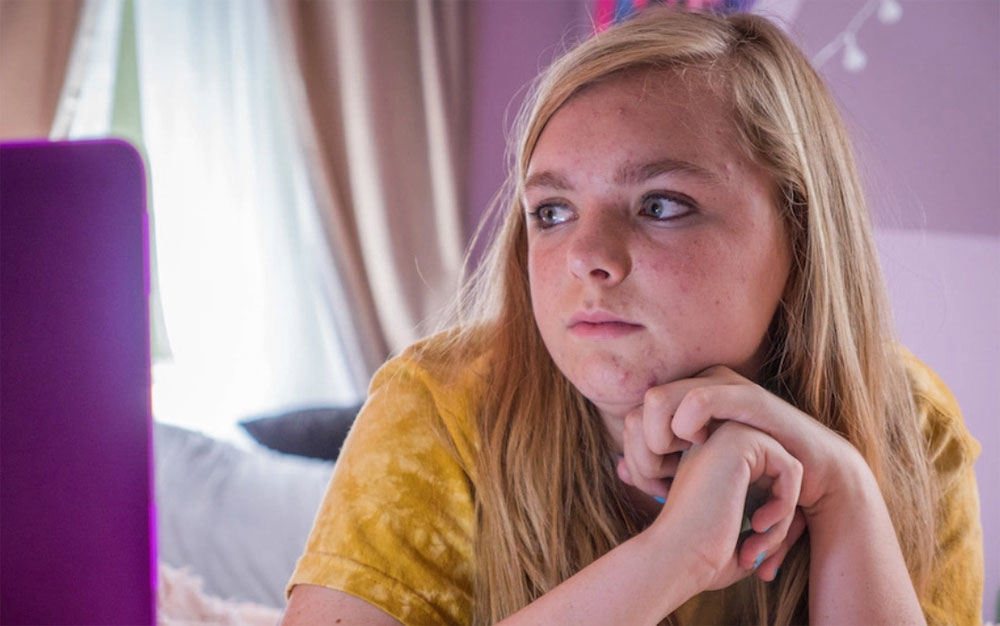Instead of bringing out music sheets to jot down ideas, Anna Meredith is known for pulling out a completely blank sheets of paper and rather than writing down notes, she draws shapes that take on the dramatic contours she would like to see her music to take, an amorphous approach that has allowed her to take on projects as a composer as diverse as creating a symphonic suite comprised of the sounds of MRI scanners comingling with a string quartet to evoking the feeling of postcards home from soldiers fighting in World War I with an orchestra and choir for the recent “Five Telegrams” visual display that played outdoors at the Edinburgh International Festival. It also made her the ideal composer to channel the inner monologue of Kayla (Elsie Fisher), the 13-year-old heroine at the center of Bo Burnham’s coming-of-age film, “Eighth Grade,” full of feelings and ideas without necessarily having a place to put them, making the notion of confining them to a musical staff irresponsible.
“I still would look at what a scene was doing dramatically, just for myself do a little tiny sketch of the shape was of what was happening, what I was trying to do – in a way, it was just reinforcing these map sketches that I normally do,” said Meredith.
Meredith had never composed for film before “Eighth Grade,” but while she makes music that doesn’t fit easily into any genre, the cinematic sweep of the big screen suits her well, able to amplify the enormity of Kayla’s experience through an electronic score that expresses in ions and electrons the way in which the world races around the middle schooler that are a constant threat to overwhelm the senses. For as bombastic as the score of “Eighth Grade” can be, it’s telling that the pulsing, seductive beats in the background that can be as dangerous as they are alluring tend to wrap around a strong central rhythm at the center that can make one forget in its sturdiness of the direct power it holds, though its composer was keenly aware of its possibilities.

Still, the Scottish experimental composer was surprised as anyone when she heard from her manager that from across the pond, Burnham had been interested in a collaboration. A musician himself, Burnham had already put together some demos for the film, but expressed interest in wanting someone classically trained with experience in electronic music yet didn’t have a particular musical signature. While Meredith had long wanted to write for film, her chameleonic ability to jump from one medium to another finding the right sound for any given project that made her a perfect match for Burnham had stymied previous attempts given how quickly her schedule can fill up, yet the two were able to find the time together in London to work on it.
“We spent a brilliant week here where we sat together and mostly did the bulk of the writing with him here with me in the studio working things out and chatting through the scenes, tweaking things when we need to,” recalls Meredith. “It was incredible. I’ve never had a week like it.”
Although attaching her music to a narrative after the fact was something relatively new for Meredith, as well as “creating so much music so quickly [and handling] infinitely more revisions than I would normally do,” she was inspired by the freedom she had on “Eighth Grade,” finding that Burnham wasn’t kidding when he said he was looking for music that wouldn’t be easily defined, instead echoing both the uncertainty at the age of his heroine and allowing for the full spectrum of emotions to register, though it was up to the composer to never let it feel random.
“Bo said he didn’t want a theme for Kayla or Dad’s theme or anything because [Kayla] lives so much in the moment, so I tried to look at each moment as distinctly as I could within our sound world of certain types of synths I was using,” says Meredith. “Bo also said he thought the sound should be all electronic because she is a teenager listening to mostly electronic music, so even if the content of the music is different, the sound world could be her sound world, even if they were playing entirely different music to what she’d be listening to. So I was just trying to treat each scene for what it was by using a palette of sounds that tied it all together a little bit more.”

“[Bo’s] got an amazing ear and eye and even the slightest detail of wanting to highlight where a camera pans from left to right, we spent a lot of time really trying to mirror the action that we felt and make sure that [when Kayla changed,] new musical elements come in,” said Meredith. “It was definitely a very detailed process and he had a lot of thoughts about how maybe at this point [the music] needs to be stripped back because of this reason or maybe it needs to be denser here, so we worked a lot to tie it all in narratively.”
Remarkably, Meredith was able to create something cohesive despite only seeing the film in bits and pieces before its premiere at Sundance earlier this year, an experience that was as overwhelming for her as it was for audiences.
“it was very moving seeing the final [version] there and I was so happy with how present the music was — how loud it was,” Meredith says with a smile seemingly stretching across the Atlantic at the end of our call. “It’s a brilliant film and it was a big learning experience in terms of seeing the whole process and how quickly it worked, but it was amazing and I hope I can do it again.”
“Eighth Grade” is now in theaters.




